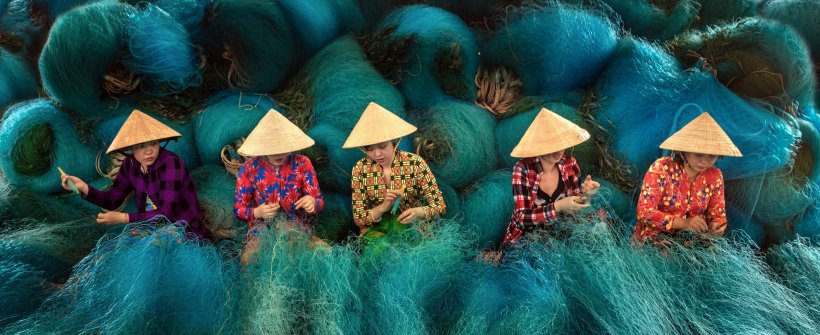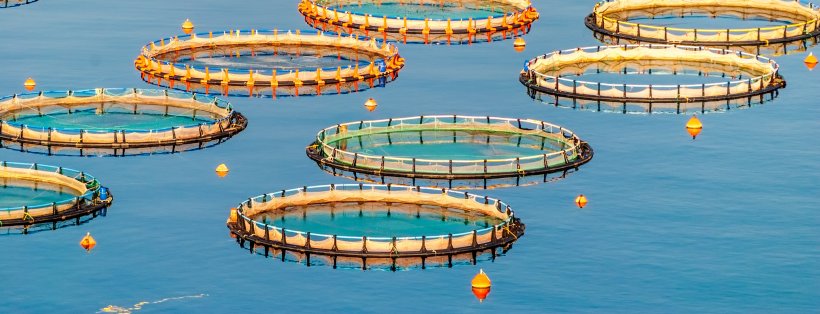Information is generally lacking about South East Asian fisheries in terms of their biology, fishing practices, and environmental impact, as well as their contributions for social (employment, food security implications, etc.), or economic (value, trade dynamics, etc.) factors. Some social and fisheries management issues are well known and attract criticism right across the fisheries, fishmeal, fish feed, aquaculture, seafood and retail sectors, both in SEA and beyond where some of the markets for the regional products extend. It is challenging to assess long-term viability, yet these fisheries are of key importance to direct and indirect food security in the region and globally, and represent a regional societal vulnerability. What is needed urgently is an understanding of these fisheries from the perspective of social, economic and environmental sustainability.
The regional challenge with fisheries management is reflected within the raw material supply for aquaculture. The SEA fisheries provide a large volume of raw material for fishmeal and fish oil production, which is supplied into the aquafeed markets in SEA for manufacture of feed for the regional aquaculture industry. The development of certification standards for aquafeeds has placed additional emphasis on the importance of sourcing sustainable feed ingredients, and the importance of sourcing fishmeal and fish oil through certification schemes such as the MarinTrust standards is now being brought to the fore. Improvements need to be made in the region in order to fill this gap in supply.

The Issue:
The global fishmeal sector is generally well-managed and responsible in its operations as seen by the high proportion of uptake of the MarinTrust scheme. One region where there are documented issues relating to social and environmental concerns is South East Asia, and in order to remove the vulnerabilities for the industry that are associated with practices in the region, it is important to understand the supply chain with a view to developing improvement projects in the future.

Project Objectives:
- Develop an improved understanding of the SEA mixed trawl fisheries and any other raw material supply into the fishmeal industry, as well as the fishmeal industry itself, by extracting data from available sources that relate to economic, environmental and social issues;
- Propose a plan for a change process in seafood supply in the region, including FIPs and any other relevant approaches including fisheries management strategies, government regulation, certification schemes, etc.;
- Provide a comprehensive report summarising the issues, the actors, and the plan for change, including proposals for projects to implement the change process.
Stakeholders: SFP, Retailers, Regional National Governments, FAO, Worldfish, Feed companies; Aquaculture companies; Fisheries companies; Fishmeal companies; NGOs; seafood certification schemes.
Contractor: Fish Matter (Duncan Leadbitter)
Main Findings:
The main findings were released on April 26th 2019. You can access the press release here as well as a summary report, an infographic and an FAQ.
Recommendations*:
Provide assistance to fisheries with regard to assessment processes
IFFO RS (now known as MarinTrust) could finalise its assessment system for multispecies fisheries and provide a pathway to approval as soon as possible. The RS system, via the Improver Program, is the key mechanism for involving industry in supporting improvements in fisheries management. The RS assessment system needs to ensure that it can also cover species diverse, tropical purse seine fisheries.
IFFO and GAA could facilitate the process for fisheries to engage in FIPs, be it by providing information on FIPs in general and on fishery assessments and fishery action plans more specifically, by coordinating contacts and improving communications among stakeholders, or maybe even the establishment of a source of funds aimed at providing assistance to fisheries that want to engage in FIPs.
Share knowledge
IFFO and GAA need to maintain an up-to-date appreciation of developments in the understanding and management of tropical multispecies fisheries. There is a considerable degree of interest in this area and there are links to developments in approaches to fisheries elsewhere in the world.
GAA and IFFO could consider reviews of other countries that have similar fisheries that link to the farm shrimp industry. Examples include India, China and Bangladesh.
Develop further research
GAA and IFFO could consider outreach work to feed and other related sectors aimed at promoting formulated feeds as a mechanism for reducing the incidence of direct feeding of bycatch to species such as groupers, spiny lobsters, crabs, snakeheads etc. This would have both resource management and fish health benefits.
GAA and IFFO could consider evaluating the purse seine fisheries as these are common but their contribution to the fishmeal sector is unknown beyond anecdotes.
The structure of the industry and, especially the links with the food processing sector, is not well documented and a better understanding would be positive for industry development purposes but also important for understanding supply chains and traceability.
*Resource permitting
Click here to access the Sustainable Fisheries Partnership foreword to the report as well as the full report.








